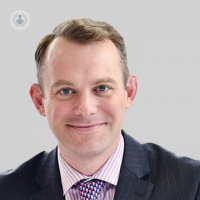Scar healing: ask an expert
Escrito por:Operations leave scars and plastic surgery is no exception. Many patients may worry about going under the knife because of the marks they could be left with. How long does it take scars to settle and how can you look after them and help them to heal? We asked expert plastic surgeon Mr Rob Winterton our biggest questions about scar healing.

How long can it take for scars to settle after plastic surgery?
Everybody is different. From a medical perspective, scars will usually keep changing and improving over a couple of years. Most improvements are seen over the first 3-6 months. With the passage of time, almost all scars fade, becoming white and soft after long enough. Particularly after plastic surgery, everyone wants it to happen immediately, but it’s a question of waiting.
Do I need to avoid the sun?
Surgical scars are more sensitive to the sun than the normal skin surrounding them, and so they’ll need protecting with high-factor sun cream and covering with clothing during the maturation process. Eventually, once mature, they can be treated normally, using the same sun precautions as you would use on the surrounding skin.
Can exercising interfere with scar healing?
No! Basically, once the original wound has healed and your surgeon says you can return to action, exercise won’t make any difference to the scar per se.
Are there any creams or products I can use to help them heal?
In the case of uncomplicated scars, there are three key things that usually help them to heal. The steps to scar treatment are:
- Stretch
- Massage
- Moisturise
Stretching and massaging are physical manipulations the patient should be doing regularly. Scars are made of collagen – a structural protein found all over the body. However, unlike in the original tissue, the collagen in scars forms cross-links and aligns in one direction, making them stand out against normal skin. Stretching and massaging help to break down some of the cross-links in the collagen, which helps the scar to soften more quickly. Massaging with some sort of moisturiser also helps.
For regular scars, there are two main kinds of products for sale out there:
- Bio-oil
- Hyaluronic acid preparations
There is not much evidence that any one is better than any other.
My best advice is that the patient should be using a good moisturiser that is kind to the skin and stretching/massaging frequently.
If a scar is hypertrophic (red, pink, lumpy, and itchy), then a silicone preparation or silicone sheets can help to settle the scar down and control symptoms.
Are there any foods I should eat/avoid?
There is no strong evidence to say that diet will affect scar quality, other than being well-nourished and eating a generally healthy, balanced diet.
Do you have any other tips on looking after scars?
The two main tips I have are as follows:
- Listen to the advice of your plastic surgeon.
- Stretch, massage, and moisturise – nobody does this as much as they should. Make time in your life to look after your scars!
Visit Mr Winterton’s Top Doctors profile to book an appointment.



